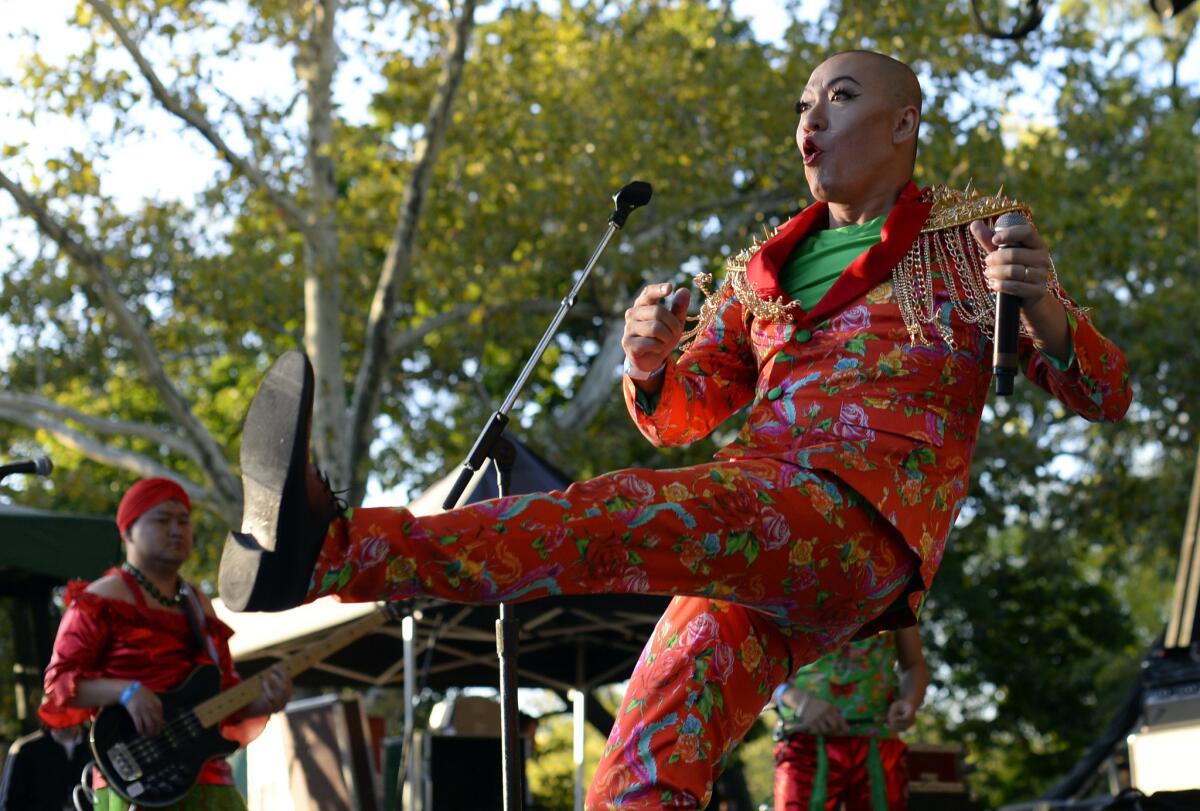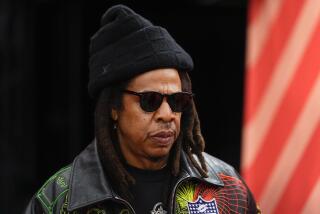Music firm brings Chinese indie rock groups to U.S. audiences

In a country where the vast majority of pop music acts still seem prepackaged for the karaoke machine and syrupy anthems dominate the airwaves, China’s three-day Strawberry Music Festival and smaller Modern Sky Festival are can’t-miss affairs for mainland hipsters.
The festivals, featuring indie artists playing such genres as death metal and pop, have become a “rite of passage” since they started seven years ago, says Archie Hamilton of the Chinese music promotion agency company Split Works. For the hundreds of thousands of hip Chinese youths who attended the festivals last year, “it’s something you’re supposed to do.”
The events are just two of 20 music festivals put on each year in China by Modern Sky Entertainment Ltd., the country’s largest independent record label. The company was founded in 1997 by rock singer turned entrepreneur Shen Lihui, who has developed it into a music powerhouse that also stretches into publishing, fashion and art.
Now Shen is turning his attention stateside. He kicked off the Modern Sky Festival in New York this month, a U.S. version of the kind of festivals he holds in China.
More than 6,500 people attended the concerts in Central Park, which paired Western indie stars Cat Power, Stars, Ted Leo and Aimee Mann with Chinese bands including Rebuilding the Rights of Statues, Queen Sea Big Shark and Second Hand Rose.
The mixed bill was an acknowledgment of the challenge of selling Chinese-language music to America. But Modern Sky thinks Chinese indie rock can resonate globally — and hopes the artists can present an image of China beyond the headlines.
“Actually, I don’t think rock music has boundaries,” said Shen, kicking his designer sneakers up on his cluttered desk in Beijing.
“I don’t know what people in New York think of Chinese people nowadays,” added Shen, “but every story has many angles. I think we can present one of the angles of the story. People that find us cool will be attracted to this.”
Shen takes pride in the fact that his is the only Chinese music label to have expanded to the U.S. Modern Sky, a privately held company with only a few dozen employees, has had a New York office for eight years. But that office’s main function has been booking American acts for festivals in China, not vice versa.
The festival’s Western stars, the majority of whom have done some business or performed at Modern Sky’s festivals in China, were the headliners at the Central Park festival. But Michael LoJudice, who runs the New York offices of Modern Sky, sought to round out the crowd by reaching out to New York’s Chinese expat community as well as Chinese Americans — even though many have never been to China.
New York has the largest Chinese population of any city outside of Asia, and Chinese are on the cusp of being the largest group of new arrivals in the city. But bringing the festival abroad may be more about boosting the bands’ prestige in China rather than selling records in the U.S.
“Most of these bands are not well-known,” LoJudice acknowledged. “It’s hard to get people to pay attention to a band they’ve never heard of that doesn’t have seals of approval from reputable record labels.”
Before the New York show, Modern Sky did a targeted outreach to the Chinese community, putting ads on LCD screens in malls in Chinatown, promoting the festival in the local Chinese-language media, and creating bilingual ads and fliers.
Compared with its counterparts in New York, Chinese independent music is a recent and still small phenomenon.
China’s music business has greatly expanded since the 1970s, when bands were first allowed to release music beyond revolutionary anthems. And there was hardly any indie music just a decade ago.
Modern Sky’s label began with just three bands, Shen’s schoolmates from the Beijing Institute of Graphic Communication. From there, the company has grown by branching out into a variety of youth-related industries, including fashion, Web design, animation and product branding.
The company’s label has expanded from three bands — including Shen’s own group, Sober — to 40 artists. But the bulk of the company’s activities are showcased at the 25 festivals it has thrown this year.
Shen said half the company’s annual $32 million in revenue comes from these festivals. The events are big business in China, with tickets ranging from $60 to $70 apiece for the more than 260,000 youths who attended the Modern Sky and Strawberry Music festivals in Beijing and Shanghai last year.
The label has sent Chinese indie bands to the United States before, but just on an individual basis. They are part of a growing trend of Chinese bands touring college campuses and international music festivals, such as South by Southwest in Austin, Texas.
But touring is difficult, said LoJudice, because flights are expensive and visas can be troublesome to obtain. In addition, Chinese bands are not used to being crammed into vans, doing long road trips and eating American-style food.
“If you’re not making any money, then a lot of times the bands think it’s a waste of time,” LoJudice said.
The acts that performed in New York were hoping the exposure would bring them not only new fans, but also attract the attention of agents and publicists who might get them more exposure.
The bands were intended to represent the current zeitgeist of alternative Chinese music. Take, for instance, Omnipotent Youth Society, which croons alt-rock stories of rural villages, or anti-establishment rockers Rebuilding the Rights of Statues. Then there was Second Hand Rose, which weds rock with traditional Chinese instruments.
Modern Sky has plans for a follow-up in Helsinki next August. It has also discussed expanding the festival in coming years to California.
“We stand out,” LoJudice said. “I think it’s an interesting story. Now they’re bringing a Chinese music festival — not a Chinese traditional culture event — to America, to Central Park, to New York.”
More to Read
From the Oscars to the Emmys.
Get the Envelope newsletter for exclusive awards season coverage, behind-the-scenes stories from the Envelope podcast and columnist Glenn Whipp’s must-read analysis.
You may occasionally receive promotional content from the Los Angeles Times.






